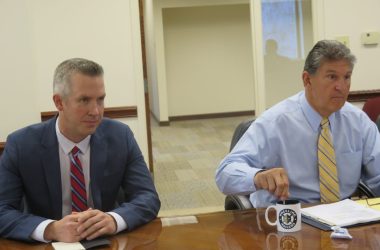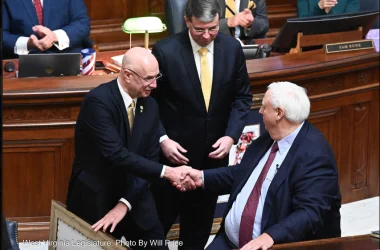By LINDA HARRIS
The State Journal
CHARLESTON, W.Va. — What do you do when your jails are overflowing, you have nearly 600 openings for correctional officers you can’t fill and 10 counties that, collectively, have fallen more than $5 million behind on their regional jail fees?
State Sen. Charles Clements, R-Wetzel, and Del. Tom Fast, R-Fayette, are the first to concede they aren’t sure. The two lawmakers co-chair the Legislature’s Oversight Committee on Regional Jail and Correctional Facility Authority-Interim. Topping their committee’s to-do list during interim meetings: Gathering information about the problems facing the state’s correctional system, as well as ideas for fixing them.
If there’s an easy, clear-cut answer, they haven’t found it.
“(Overcrowding) is all over the state, not just one particular area,” Clements said. “And they’re understaffed all over the state. We train people, and there’s federal prisons that will hire them pretty quickly and the pay is 50 percent or 60 percent more than what they’re getting from the state.”
The Mountain State operates 10 regional jails housing 5,082 inmates, as well as 17 prisons and work camps with an inmate population of 5,919
Prisoners awaiting trial and those facing a year or less behind bars generally serve their time in regional jails. But with the state’s prisons bursting at the seams, about 1,300 felons are being held in regional jails until there’s space for them in prison.
They’re doing all that with just over 1,500 correctional officers.
“I just think we’ve got to do something to alleviate the overcrowding, whether that means minimum sentences or alternative sentencing or home confinement for some things,” Clements said. “But no matter what we do, it’s going to cost us money as taxpayers. We have to realize that.”
And that’s where the problems begin.
The bonds that financed construction of the regional jails decades ago will be paid off in the next three- to five-years, Fast said, “and we have our eyes on that money.”
“But I guarantee you there’s about 80 other (funding) needs out there that have eyes on it, as well,” he said.
Fast figures the corrections system should be a priority, though.
“The state’s hurting for money everywhere, but our prison system is a constitutional mandate,” he said. “It’s an essential function of government. We’re paying for a lot of things that are not (essential functions), but this is a function of government.”
Fast figures the committee’s primary focus should be the staffing shortage — “why we have it and how to fix it.”
West Virginia is currently spending about $13.5 million a year on overtime to staff its prisons and jails. Despite a recent $1 hourly pay raise, the state still brings up the rear in correctional officer pay.
“Of the 50 states, we are 50th,” Fast said. “We train correctional officers right and left, and they leave, on average, after six months. They jump over to the federal penal system and add thousands of dollars to their paycheck immediately.”
Making the pay scale attractive enough to attract and retain personnel would be pricey, Fast said, but he figures it would be offset at least in part by the reduction in overtime.
Some prisons “are pretty much double capacity” — a problem that’s compounded by Department of Correction inmates being held in regional jails “for extended periods of time because there’s nowhere else for them to go,” he added.
Fast said judges already have sentencing options, and it’s up to them to decide if an offender is a candidate for home confinement, drug courts or probation.
“We can’t tell (them) what to do,” Fast said.
But not all West Virginia counties can afford to pay the mandatory per-diem fee for each offender sent to jail in their jurisdiction. Ten counties are currently in arrears on their regional jail fees, with two — Cabell and Webster — accounting for nearly $4 million of the $5.17 million regional jail fee delinquencies statewide. It’s a bill the state Supreme Court has said must be paid.
“It’s my understanding only about five or six are really in arrears; the others are making payments,” Fast said. “But it’s a societal bill that has to be paid. If society is going to put these people in jail, if the judge is going to put them in jail, it’s got to be paid.”
Fast figures the only way to solve the overcrowding problem “is to enlarge our facilities.”
That’s something Clements doesn’t want to see happen.
“The (jail) bonds will be paid off in another couple years,” Clements said. “And when they are paid off, at that point the money could possibly go into running the jail system. It would alleviate a lot of the problems, but it wouldn’t address overcrowding. I think the last thing we want to do is build more jails and prisons. I think we’re going to have to look at alternative sentencing.
“Overcrowded and understaffed — that’s a dangerous situation to be in. If we, as Legislature, can come up with some type of interim funding, at least to that point to help with the situation, I think we should do it,” Clements added. “Then, when the bonds are paid off, we can take that bond money to use to keep things running smoothly.”
Staff writer Linda Harris can be reached at 304-374-0403 or email [email protected]
See more from The State Journal




